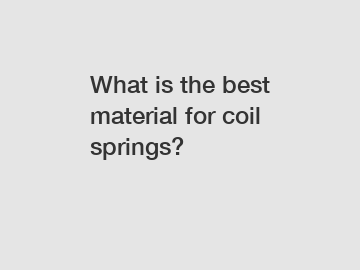Mar. 19, 2024
### What is the best material for coil springs?
**Answer:**.
1. **What are coil springs?**.

Coil springs are mechanical devices that store energy and provide shock absorption by compressing and expanding in response to external forces. They are commonly used in a variety of applications such as automotive suspensions, industrial machinery, and household appliances.
2. **What are the key characteristics of materials for coil springs?**.
The best material for coil springs should have high tensile strength, good fatigue resistance, and excellent spring properties. Tensile strength refers to the ability of a material to resist breaking under tension, while fatigue resistance is the material's ability to withstand repeated stress cycles without failure. Spring properties include elastic modulus, yield strength, and resilience.
3. **What are the common materials used for coil springs?**.
See also:The most common materials used for coil springs are high-carbon steel, stainless steel, and alloy steel. High-carbon steel offers good tensile strength and fatigue resistance, making it suitable for heavy-duty applications. Stainless steel is corrosion-resistant and ideal for environments with moisture and chemicals. Alloy steel provides a balance of strength and flexibility, making it versatile for various applications.
4. **What is the best material for coil springs?**.
The best material for coil springs depends on the specific requirements of the application. For general-purpose coil springs, high-carbon steel is a popular choice due to its cost-effectiveness and durability. Stainless steel is preferred for applications exposed to corrosive environments. Alloy steel is recommended for high-performance applications that require a combination of strength and flexibility.
5. **What are some other factors to consider when selecting material for coil springs?**.
In addition to material properties, factors such as coil spring design, manufacturing process, and end-use conditions should be considered when selecting the best material. The coiling process, heat treatment, and surface finish can also impact the performance and longevity of coil springs.
In conclusion, the best material for coil springs depends on the specific requirements of the application, with high-carbon steel, stainless steel, and alloy steel being common choices based on their unique properties and characteristics. It is essential to consider various factors and conduct thorough testing to ensure the optimal material selection for coil springs.
If you are looking for more details, kindly visit Electromagnetic shock absorbers for seismic isolation systems, OEM Steel Auto Shock Absorber, vehicle coil springs.
If you are interested in sending in a Guest Blogger Submission,welcome to write for us!
All Comments ( 0 )